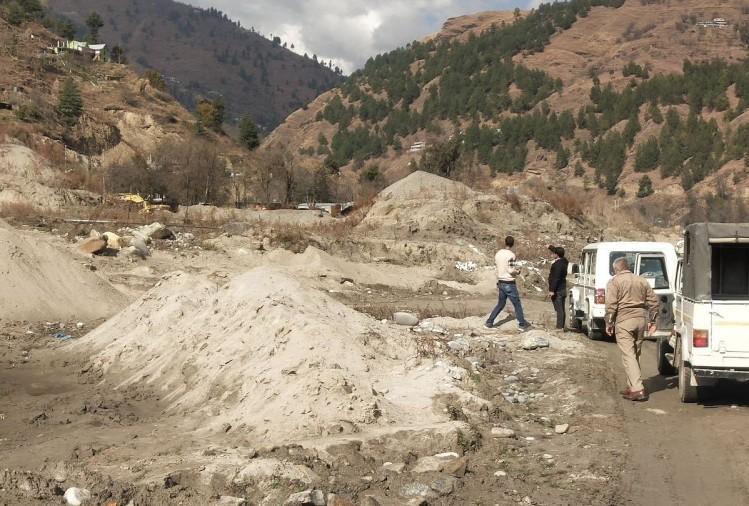Himachal Govt Ignores Ecological Concerns, Tweaks Rules to Ease Sand and Stone Mining

Image credit: SANDRP
New Delhi: With large-scale infrastructure activities already causing environmental havoc in the hilly state of Himachal Pradesh, the BJP-led state government’s decision to ease rules for mining of minerals, like sand, stones and gravel, has drawn criticism from activists and local communities alike. On February 10, the Himachal Pradesh Cabinet headed by Chief Minister Jai Ram Thakur gave its nod to a rule which would legalise unauthorised transportation of minor minerals.
The provision which has been introduced in the form of an amendment into Himachal Pradesh Minor Minerals (Concession) and Minerals (Prevention of Illegal Mining, Transportation and Storage) Rules, 2015 is itself cloaked in ambiguity.
“Any person, not being a mining lease holder and not in contravention of Rule 72 [prevention of illegal mining], 75 [prevention of illegal storage], 79 [transportation of minerals with valid transit pass] and 80 [inspection of minerals during transit], if could not produce transit pass after the stage of transit, shall be liable to pay royalty at the applicable rates and penalty @ 25% of the royalty,” states the new rule.
A transit pass is issued by the mining leaseholder to any transporter carrying a consignment of minor mineral, countersigned by the concerned mining officer. It is issued in three copies – out of which two copies are to be issued to the transporter while the third copy is to be retained by the leaseholder – and is a vital document that mentions the volume of mineral that is being transported. As per the new rule, royalties and penalty are payable only if the consignment is found or caught without a transit pass while being transported. It is apprehended that by foregoing a transit pass, a transporter can hide information on the actual volume of mineral that is being transported.
The ambiguities in the new rule, it is further apprehended, will only allow for illegal transportation of minor minerals. The rule makes it permissible to transport minerals without transit pass subject to payment of royalties and penalty if caught. But this provision, to add to the ambiguity, can be applicable only if Section 79 (transportation of minerals with valid transit pass) of the original Minor Minerals (Concession) and Minerals (Prevention of Illegal Mining, Transportation and Storage) Rules, 2015 is not contravened. Further, the rule has been made applicable only to the person who is not a mining lease holder stressing that Section 72 (section defining illegal mining) should not have been contravened. But it is not clear if the provision will be made applicable to mining lease holders who choose to transport the minerals which they themselves excavate.
The industrial lobby argues that this reform will boost infrastructure development in rural areas of Himachal Pradesh. On the other hand, experts and activists allege that tweaking of rules in the name of speeding up infrastructure work will only encourage illegalities in the mining sector and lead to irreversible damages to the fragile ecology of the state. A number of landslide incidents, as also flash floods, often attributed to unscientific and illegal mining practices and haphazard construction activities, have been reported from Himachal Pradesh in the recent past. In a major landslide incident in Kinnaur district on August 11 last year, at least 25 persons had lost their lives. The state has witnessed a number of minor landslide incidents too, which local communities attribute to construction activities on fragile hilly terrain.
At least five houses were damaged in a landslide that took place in Jhadota village in Bharmour area of Chamba district in December last year, where construction work is underway for a 180-Megawatt hydro-power project. All 79 families, who have been living in Bharmour for the past several generations, are nomadic Gaddis classified as Scheduled Tribes.
“We had a close shave with death because we had vacated our dwelling units hours ago anticipating a landslide. Testing activities for the hydropower project had commenced just before the landslide. No action was taken though we alerted officials about leakage of water from the hillside several days before the landslide. We have been living in constant fear ever since,” Manoj Kumar (37), a local resident of Jhadota told NewsClick.
Environmental activists based in Himachal Pradesh allege that the state government has failed to curb illegal sand mining. In June 2017, the Principal Bench of the National Green Tribunal in New Delhi had ordered the Himachal Pradesh government to put an end to illegal mining activities in the state “under all circumstances”. But experts point out that numerous flash flood incidents in the state are only a result of unauthorised dredging of sand from river beds.
At least 14 persons had been killed and several more had gone missing when flash floods hit Lahaul, Spiti and Chamba district of Himachal Pradesh in July 2021 following heavy rains. Several bridges and road stretches had also got damaged from landslides triggered by the flash floods.
“It is a matter of great regret that ecological disasters in Himachal Pradesh are being entirely attributed to climate change. Arbitrary changes of land use in ecologically fragile areas, deforestation and haphazard infrastructure development activities which destabilise the slopes of hills are also responsible for landslide incidents. Dredging and mining of sand using heavy equipment is continuing unabated in several river stretches of the state despite the orders of the green tribunal,” said Manshi Asher of the Himdhara, Environment Research and Action Collective based in Himachal Pradesh.
Relaxation in transportation of minor minerals is not the only rule that has been tweaked by the state government. Through a separate gazette notification, the government has also introduced provisions whereby digging up to 1.5 metres on private land for the purpose of excavating clay (which can then be sold to brick kilns) will not be categorised as a mining activity. The government has further eased rules governing usage of heavy equipment for mining purposes. The collection and lifting of minerals “with the help of tyre-mounted front-end loader up to 80 Horse Power (HP) without provision for attaching backhoe” shall not be considered as mechanical mining as per this amendment which has also been made to rules governing mining of minor minerals. It is presumed that this amendment will encourage sand dredging on river beds with the help of heavy earth-moving machinery.
“Illegal and mechanised excavation of sand, stone and other minor minerals from riverbeds has been a long-standing issue in Himachal Pradesh. It has resulted in river erosion and low groundwater table. However, the state’s inaction on the issue has been debilitating. Even the sparse action such as banning mechanised mining has been met with threats of halting operation by miners and stone crushers,” said Meenakshi Kapoor, a Himachal Pradesh-based independent researcher of environmental policies.
It has been alleged that the change in rules for mining of minor minerals in Himachal Pradesh was brought in at the behest of the contractor lobby. The gazettes of the amended rules were notified in the midst of an ongoing strike by civil contractors in Himachal Pradesh wherein the lobby had decided to suspend all government works till their demands were met. The call for the strike was given on February 8. Amongst a slew of demands, which included payment of outstanding dues against all completed works, the lobby had also demanded relaxation of transit rules for minor minerals. It had been argued by the contractor lobby that while transit passes for minor minerals, like stone, gatka, grit and sand had been made mandatory by the state government, material with transit passes was not available in sufficient quantities to execute works of the government.
Notwithstanding the environmental issues that could possibly be a result of relaxation of mining rules, the mining lobby has argued in favour of the amendment.
“The rule has been put in place only as a deterrent to prohibit illegal transportation of minor minerals. Provision of penalties will definitely help curb unauthorised transportation of minerals,” said BK Bhatia, additional secretary general of the Federation of Indian Mineral Industries.
Top officials of the state’s Department of Environment, Science and Technology were contacted by this correspondent on behalf of NewsClick. It could not, however, be immediately ascertained if this department had been consulted by the Department of Industries, which controls mining activities in the state, before undertaking the amendments.
Experts point out that tribal communities of Himachal Pradesh are most affected by the adverse impact of environmental degradation caused by illegal mining, haphazard construction, and no-holds-barred infrastructure development activities. Nearly half of the geographical area of Himachal Pradesh is designated as Schedule 5, in accordance with the provisions of the Constitution of India, due to the preponderance of tribal population. Schedule 5 areas are those which are identified and listed for administration through special measures (owing to the preponderance of tribal population in these areas) in accordance with Article 244 (1) of the Constitution of India.
Out of a total area of 55,673 square kilometres, approximately 23,655 square kilometres fall under Scheduled 5. This constitutes 42.49% of the total area of Himachal Pradesh. The total population of Himachal Pradesh living in these Scheduled Areas is 1,73,661, of which 1,23,585 belong to tribal communities. Scheduled Tribes, therefore, constitute nearly 71.16% of the total population living in areas designated as Schedule 5.
Ironically, the districts of Lahaul, Spiti and Kinnaur, as also the Pangi tehsil and Bharmour sub-tehsil in Chamba district, which are listed as Schedule 5 areas in the state, are also areas from which most incidents of landslides and flash floods are being reported.
“The government, instead of fulfilling its Constitutional obligation of being the custodian of communities in Schedule 5 areas, instead appears to be tweaking laws that would ultimately benefit corporates and the mining lobby. The rule to let off illegal mineral transporters with a minor penalty is akin to post facto regularisation of building law violations in urban areas which has encouraged unauthorised construction activities in our cities,” said R Ravi of mines, minerals and PEOPLE (mm&P), a collective of individuals and communities affected by mining.
The writer is an independent journalist.
Get the latest reports & analysis with people's perspective on Protests, movements & deep analytical videos, discussions of the current affairs in your Telegram app. Subscribe to NewsClick's Telegram channel & get Real-Time updates on stories, as they get published on our website.
























